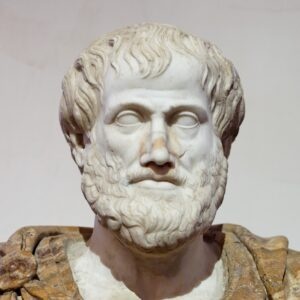Aristotle was born in the year 384 BC in Stagira, a city on the Greek northeast coast. His father, Nicomachus, was a court doctor of the Macedonian king. Hence, while a kid, he learned a lot about biology and medicine. However, both of his parents died when he was only about thirteen.
His custodian, Proxenus of Atarneus, gave him further education. Later, he sent him to the Athens-based academy of the renowned philosopher Plato. He remained there for twenty years until Plato’s death.
In 348 BC, he left for Assus in Anatolia, where his friend, Hermias of Atarneus, ruled. Later, he traveled to lesbos to study marine life and biology in general. Next, he came to Macadenia to teach the son of Phillip II, Alexander (future Alexander the Great).

✟ 322 BC, Chalcis, Ancient Greece
The work of Aristotle
Aristotle developed many interests with insight into politics, logic, math, rhetoric, theatre, astrology, and much more. Upon his return to Athens in 335 BC, he founded his academy, the Lyceum. Regarding his works, the period between the years 355 and 323 BC was the most fruitful.
Conveniently, his most important book on politics is called Politics. Aristotle explains essential words such as polis (city-state), politics, and citizen. Further, in the books, he describes types of democracies, regimes, and more. According to Aristotle, there are six forms of government: monarchy, oligarchy, polity, tyranny, democracy, and aristocracy. Along with Plato’s Republic, it is one of the most significant classical political works.
Besides, he supported the republican form of government and is considered as one of the founders of classical republicanism. But, the weight of his many publications reaches far beyond political science. Namely, he is the founder of logic as a discipline or made a crucial impact in physics. Maybe the most notable work is Nicomachean Ethics.
One of the greatest philosophers ever married the daughter of Hermias – Pythias. They had one daughter, named after the mother. In 323 BC, he was forced out of Athens due to cold relations between the Greeks and Macedonians. He died a year later, in 322 BC.
“It is the mark of an educated mind to be able to entertain a thought without accepting it.“
Aristotle

